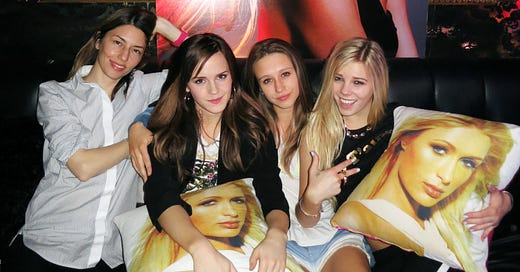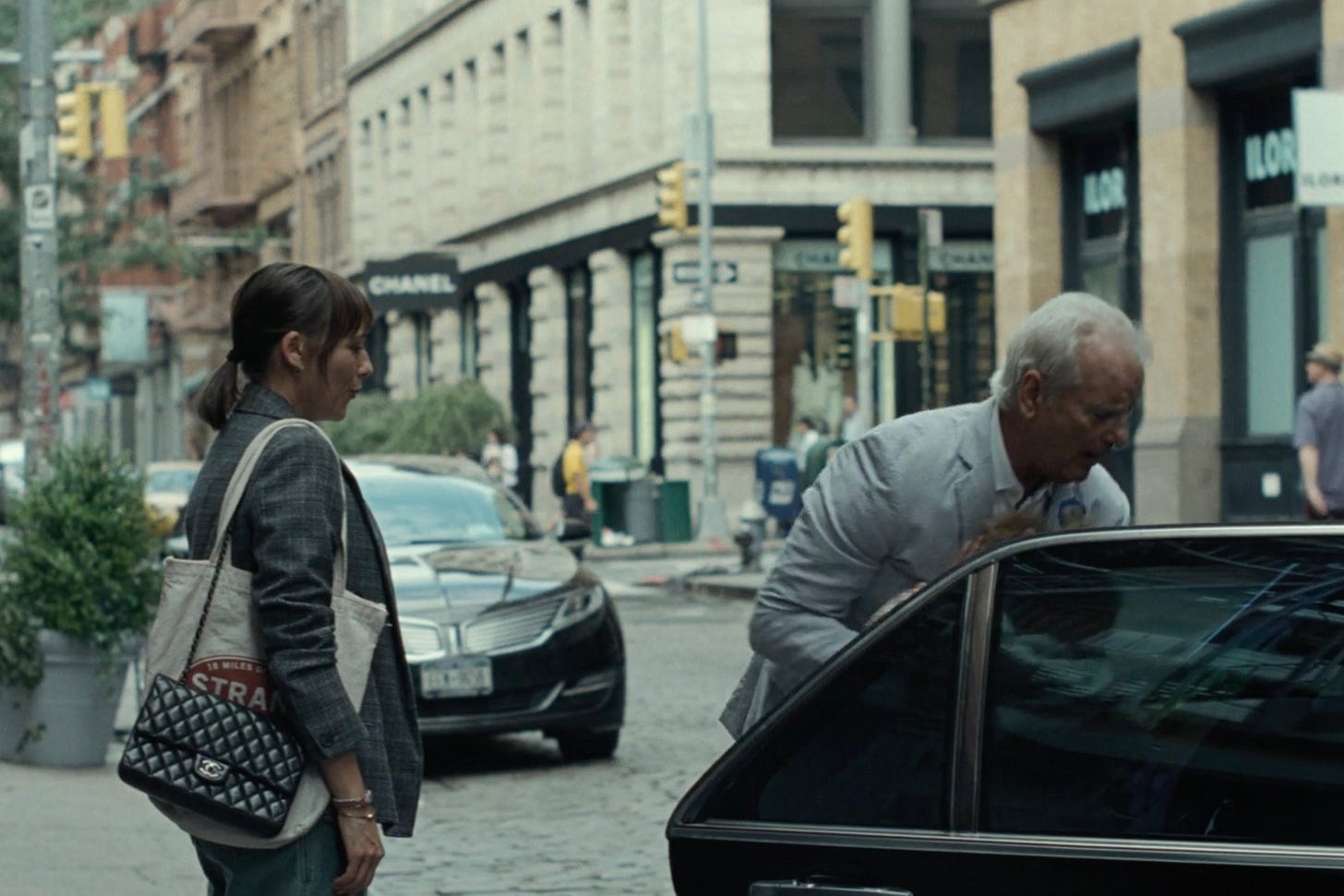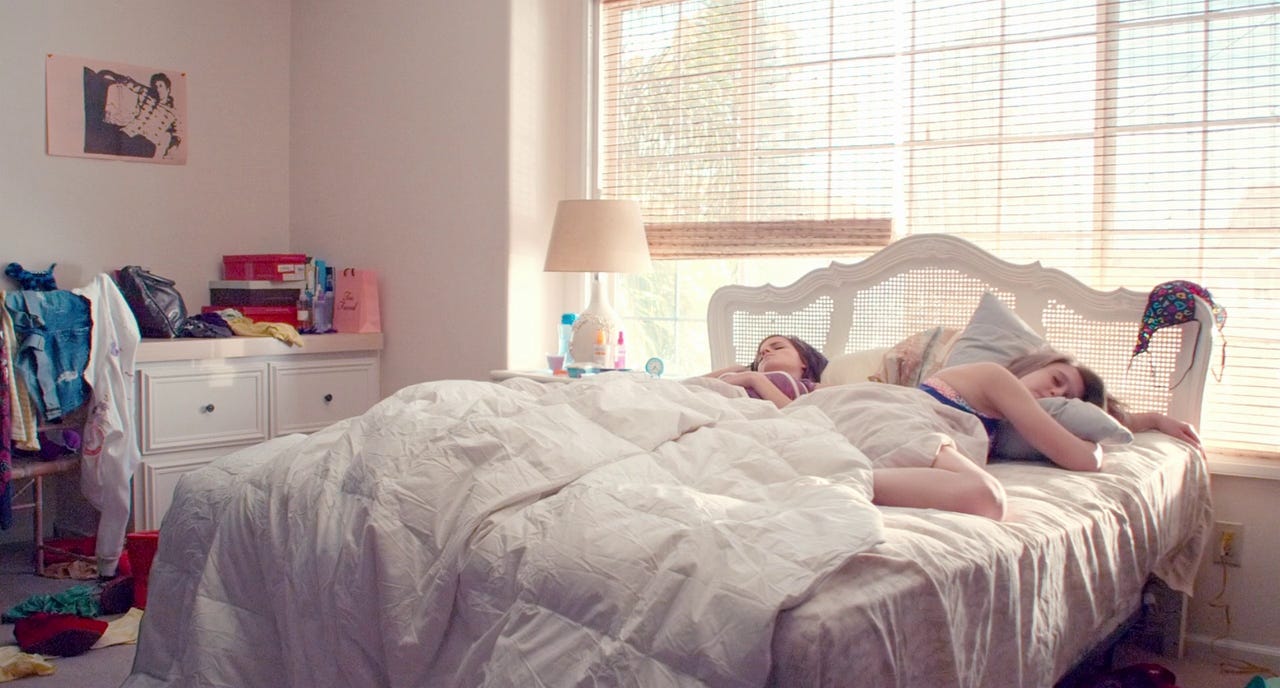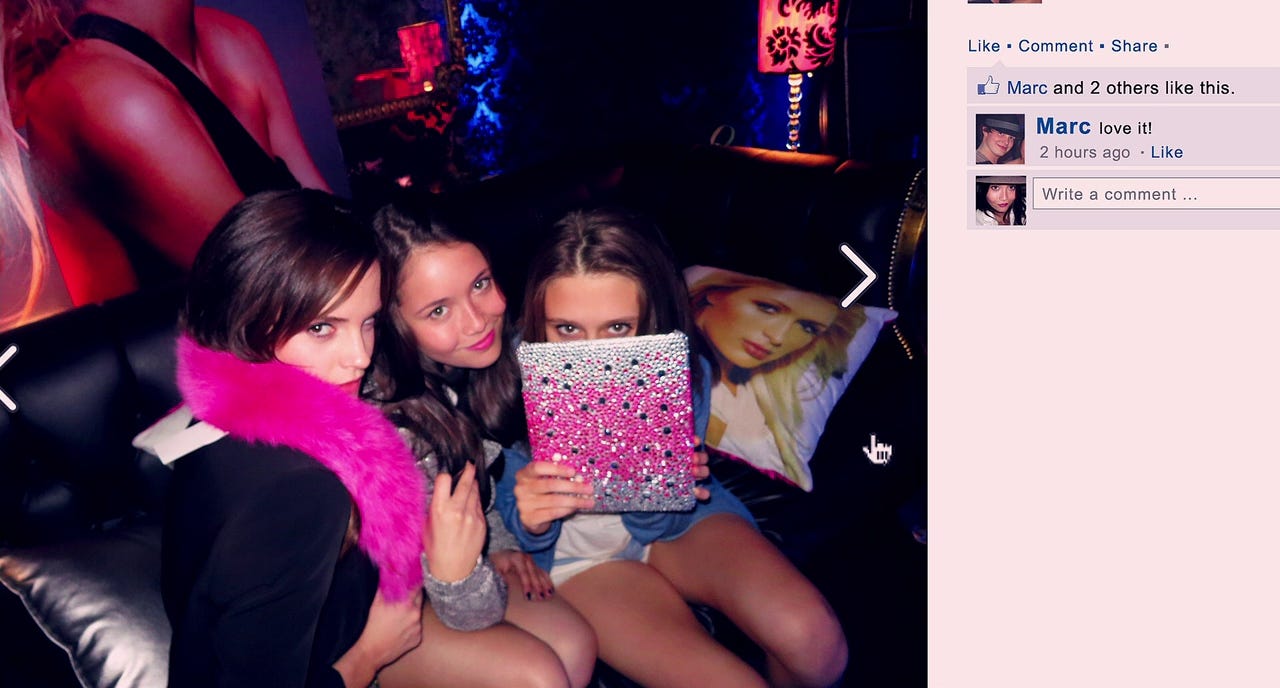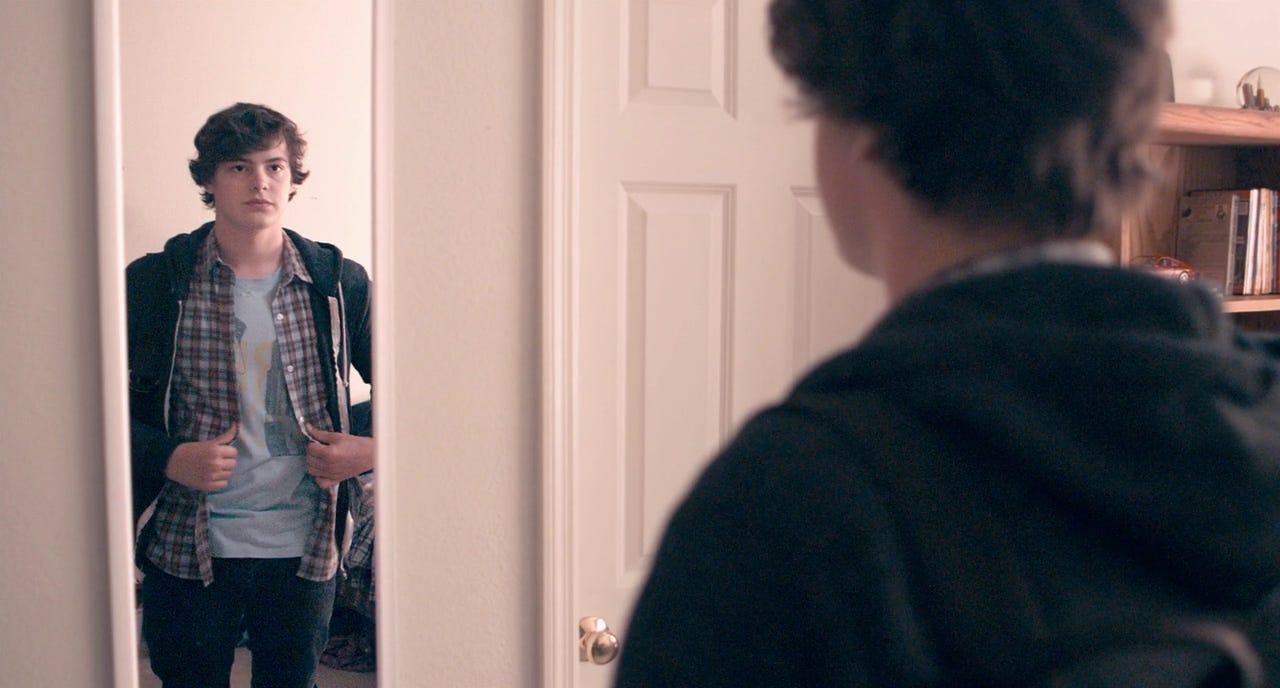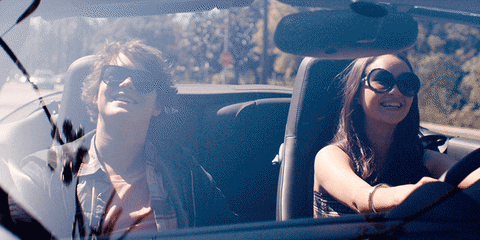10 years ago this weekend, I drove a car full of fellow bored summer school students for 90 minutes to see Sofia Coppola’s The Bling Ring on a snooze of a summer Sunday afternoon. As we trudged back across a parking lot at a suburban Charlotte mall, the complaints started coming out of the woodwork. Then, as I got into the driver’s seat, I distinctly remember offering my sheepish yet strong opinion: “I dunno, I kinda thought that was brilliant?”
It was but preparation for a decade of lonely The Bling Ring defense to come.
I do think the film has picked up some new cultural currency over time after a pretty divided, skewing negative, response at its opening. The Bling Ring feels very much at home amidst the sea of scammer stories as Coppola fictionalizes the exploits of teens who burgled the homes of celebrities, primarily ones made famous through reality TV. The film was quite literally ripped from the headlines, yet it eschewed the kind of lazy topicality that so often dooms projects of this ilk.
I started articulating something about this in an essay I wrote about The Bling Ring in 2017, but I’m further convinced after a recent rewatch that The Bling Ring is not about the past or the present of its 2013 release. This is a film about a paradigm shift — about rich, famous, elite who do not think their lifestyle is available to others and leave themselves unguarded and open to theft. That the Kardashian-ification of celebrity coincided with the collapse of the housing market (and thus the economy) does not strike Coppola as some kind of accident. As they made money for doing nothing while millions of others couldn’t for doing something, a new aspiration of how to leech off the success of others was born.
There’s no one better to talk through the knottiness of The Bling Ring with than my friend Hannah Strong, who quite literally wrote the book on Sofia Coppola.
I cannot recommend purchasing this book enough — like Coppola’s work itself, it’s both beautiful to look at and chock full of brainy insights into the world we inhabit.
We had a great, freewheeling conversation that I’ve whittled down into this weekend’s newsletter. That’s both for length’s sake and, frankly, to make Hannah and I both sound a bit smarter. I hope you enjoy our conversation about what makes this film worth watching a decade on — and how the way we view it has changed since its initial impact. If you want to (re)watch, The Bling Ring is available on Showtime and to rent in the U.S. and various subscription services in the U.K.
What were your first impressions revisiting The Bling Ring for the first time since the book?
This time I went in knowing I was gonna be writing about Emma Watson, so I guess I was paying a lot more attention to her than I necessarily had. I mean, obviously, with writing the book, I gave her a little bit of attention. But it was interesting to really home in on that character because I think I had never really thought of her as the main character. I think that the film positions Marc (Israel Broussard’s new kid who falls in with a criminally-inclined crowd) and Rebecca (Katie Chang’s queen bee of the burnouts) as the most prominent characters, I guess because that's kind of how it went down. Certainly, according to Alexis Neiers (the inspiration for Watson’s character Nicki), she wasn't the ringleader.
By virtue of the fact that Emma Watson was so famous, she does naturally draw all the energy towards her. Normally with those sorts of characters, you think there'll be a way in where you're like, "Oh, actually, there's kind of a good person deep down." But no, I think Emma Watson really went hell-for-leather. This is a totally unsympathetic character who has no redeeming features. Which is, I think, quite a harsh assessment of Alexis Neiers.
I think it works really well for the film that Coppola was making, which I don't think is trying to be a factual representation of a situation that happened. It's like Marie Antoinette, trying to comment on something that happened rather than accurately showing everything that happened. She's not a real person. People like that exist, but I don't think that emptiness of Nicki Moore is realistic.
That's why I think so many people love her in the film because it's an almost nihilistic performance. The only thing she's interested in is fame, money, and celebrities. That's it. Even when she's caught, it's just, "How can I use this to my advantage to get famous?" I felt more impressed by her. People do tend to talk about that performance in a positive light. Even if they don't like the film, they tend to say that Emma was very good. It's much more layered.
To your point of nihilism, when Emma Watson did press for the film, she disparaged Alexis Neiers "everything that I felt strongly against — she’s superficial, materialistic, vain, and amoral. She’s all of these things and I realized I hated her.” Normally, even whenever someone's playing someone unsympathetic, they try and couch it finding some humanity in the character.
Alexis is actually, I think, quite gracious about the whole thing. If someone was saying that about me, I'd feel quite upset. There's been a really interesting couple of interviews that Alexis has done fairly recently. There was one during the pandemic with Ziwe, and you do feel quite sorry for all the stuff she endured. Then to have an A-list actress saying you're this horrible human being, I think that would have quite a demoralizing effect on anyone.
I think that the film is commenting more on the society that made her the way she was. She seems to have really done a lot of work to kind of rehabilitate herself, which is great. We love to see it. But when I was writing about the performance, the reason this is still as good now as it was ten years ago is because so little has changed.
You talked about this in your piece from 2017. If TikTok existed back then, it would have functioned in exactly the same way. If anything, they probably would have gotten caught quicker because they would have blown up quicker. On Facebook, it's harder to get famous in that way. I don't know how much has changed in the way that wealth and celebrity are seen. The type of person that is idolized is different, but the film itself isn't any less relevant.
When I was watching it, this idea that you can just insert yourself into being famous is still very much a thing. People have this dream of going viral on TikTok or YouTube and suddenly becoming an A-lister. Fame for fame's sake, even now, you would have thought that it would have changed in ten years, that something would have happened in the way we perceive famous people or the way that people become famous. Actually, it's just accelerated, if anything. Thinking about the whole "eat the rich" trend and film, that's a small part of the culture, really. If you ask most American teenagers, they're still gonna say, "I would love to be an influencer."
If they want to eat the rich, it's because they think that they can ingest their power somehow.
It's not like wanting to eat the rich to dismantle the power structures themselves or to redistribute the wealth. It's to accumulate what they have. It's a parasitical thing. The Bling Ring's whole fame was entirely informed by their proximity to the celebrities. People like the Kardashians only really [became] famous because they were that close to Paris Hilton. It blows my mind that the Kardashian [show] was two years before the bling ring. It all came so close together, the advent of reality TV. The writers' strike is widely credited with ushering in the era of Laguna Beach and The Hills. Two years out, it just seems to have all combusted. I don't see it changing anytime soon.
I loved how your book puts The Bling Ring directly in conversation with Spring Breakers, not just in their themes but also in their aesthetic because Sofia Coppola said she wanted to make something that was really ugly and gauche with this film. Do you think people miss that because she was still shooting things that were pretty or luxurious?
I think she definitely finds the beautiful images within the late 2000s/early 2010s fashion and aesthetics. The thing that got me watching it back was the fashion was so uncomfortable. The high heels for every single occasion, the Hervé Legér bandage dresses. Two scenes that really get me — and I think this is where Harris Savides' absence is massively felt like in cinematography more widely — is one, the beginning where we see them breaking into Rachel Bilson's house with the green CCTV footage.
And the "dollhouse" robbery scene. Sofia wanted to cut it, but Harris convinced her to keep it. I think she thought it took you out of the action, but I think it's such a smart decision that they did keep it in because they saw themselves they were just playing dress up like kids. But also, there's this idea of voyeurism and watching something like it's reality entertainment.
It makes us complicit as audience members, which isn't really something I think Sofia does very often. The big one in her career, I would say, is like the opening shot of Lost in Translation where we're staring at Scarlett Johansson's bum. She's really turning the camera back on us and asking, "How do you feel about your comfort level here?"
In terms of the ugliness, the stuff that gets me is the McMansions. Maybe as a Brit, I maybe I find it a little bit more jarring because it's just not something I'm used to seeing as much. I only ever see that kind of thing on reality television. But it's also interesting because obviously Sofia comes from old money. I find it really interesting that she looks down on this nouveau riche. But what is really the difference between your father's vineyards and these new wealthy people who like to wear tacky looking jewelry?
I think that something I always go back and forth on about this film in particular: what does Sofia consider the difference between her wealth and their wealth? I don't think she's ever really talked about that and how she draws that line. I think it may be as simple as something like Succession, the kindargument about conspicuous consumption vs. self-wealth. It's okay to be wealthy if you're at the level of wealth where you don't have to flaunt your wealth, which an interesting line to take.
Even like something in On the Rocks, where the characters are middle class and even, I would say, rich. They're living in a really nice apartment in Tribeca, and it's like, "Well, is that better because they've got that little Bernie Sanders sticker?" It's something that maybe I think she hasn't quite figured out, how to deal with the idea that she comes from this immense world of privilege and is criticizing a different facet of that same world. That's one of the areas with a big question mark around it. Even writing the book, it's difficult to know how she feels about this as a subject. Her films are so open-ended, and in interviews, she's like, "I want it to be like your interpretation and understanding." But I'm always curious as to how she makes these compartmentalizations in her head about the wealthy.
The film, to me, feels ambivalent about wealth. It's not fully valorizing The Bling Ring like they're a Bonnie and Clyde story, but it's also not necessarily on the side of law and justice. It's very open ended, and to your point, maybe that is her struggling to reconcile her own feelings about where she fits in the schema.
There's not a lot of the media circus that was around the trial. We get the bit at the end where we see them being taken away, and we see the kids having their day in court. It's very much a coda, not really the content of the film, which I think is a really good choice. I think if this film had been more like a courtroom drama, maybe it would have had a completely different reception if there was this feeling that these kids were getting punished for their actions.
I think that's maybe what some people found quite difficult to digest about it. They're just using the publicity they get from the trial to further their own career ambitions, certainly in the case of Nicki. But again, I think that's something that I found very valuable about the film: it wears its ambivalence as a strength. It's a knotty object. Even among Sofia fans, people don't really agree on The Bling Ring. I think that tends to be the one that divides people most. Maybe that and The Beguiled, but for very different reasons.
Now I'm thinking of yet another 2013 film, The Wolf of Wall Street, that people criticized because they felt like it didn't punish the criminal protagonist enough. Especially now looking at it 10 years later, we live in a world that is run by a lot of these shameless grifters who commit crimes out in the open and don't face consequences. I feel like the film was ahead of its time, to some extent, on how the attention economy benefits people who have no shame.
It's interesting to look at something like Hustlers or even as far back as Goodfellas. Henry Hill got off quite lightly when he ratted everyone out and just got house arrest in witness protection. You're right, there's a certain level of particularly white wealth where there aren't consequences for your actions. The justice system is always going to be on your side.
Watching this film when I was in my early twenties, I was quite repulsed by it because it was one of the first times I was really coming into contact with that as a concept. That was maybe the first time that I'd ever kind of realized, "Oh, if you've got enough money, then the rules don't apply." And maybe I was quite naïve up until that point. [laughs]
But like you mentioned in your piece about Trump, it only got funnier and more disturbing with time that you can hold the highest positions in the world, repeatedly break the law — and we're seeing it in the UK, too — and there is just no repercussion or checks and balances. At the end the end of the day, you come to this conclusion of, "Oh, well, a few celebrities got robbed." It's hard to be worked up about it because ... who really cares?
I think the reason why the reason the film has endured as much as it has is because the film is not really about what they're doing. It's about why they're doing it and about the attitudes towards crime, wealth, and celebrity that I think our generation (and maybe the next generation as well) have been indoctrinated with by the media, regardless of how we were raised by our parents. It's a very hard thing to kind of get away from unless you have a lot of balance in your media diet.
I think back to my teens, and I feel quite fortunate that I had people looking out for me. That's the other thing, their parents are so absent in the film. The kids are just raising themselves, to an extent. Or, like in the case of Nicki, by the pseudo-science from her mom played by Leslie Mann.
Television raised them, essentially.
I don't want to doomsay about media influence, but I think not bringing people up with critical thinking and not empowering them to question the media that they're consuming is what the film makes me reflect on. Mindlessly consuming this stream of images with no thought process other than consume, consume, consume, I think it's very hard to break out of that. Even I struggle with not buying stuff and not being attached to material objects.
To some extent, I feel sympathy towards these kids. If you don't have the critical faculty to understand the reason you think the way you do about wealth and stuff, that's fucked up. But, at the same time, I must stress that, they did bring it on themselves. They knew what they were doing was wrong and did it! I'm not a "#JusticeForAlexisNeiers" person at all. But I'm fascinated that we've not seen more incidences of this since. I don't think we're in a place where people are learning to undo those 30-40 years of capitalistic indoctrination.
I think the film is very ingenious in the form Sofia Coppola chose for it. With her combination of glossy product shots and the characters speaking reflectively on the action, it feels like reality TV. I think people thought maybe they were getting something a little bit more like a true crime docudrama, and they just didn't quite know how to make sense of it.
I think it's that thing of wanting to see people brought to justice or an insight into them. And I don't think that the film really offers you that much of an insight into the mindset of the kids. I mean, fundamentally, I don't think it would it would be particularly interesting! They're pretty upfront: "Oh, yeah, well, we wanted to rob these people, so we decided to rob these people." But you're right, reality television is so heavily edited and constructed to portray things a certain way. I think that Sofia's film is very much playing into that. It's not giving us the reality of how things were.
I know that [Alexis Neiers] wasn't happy with the film, but to some extent, but if the kids had made a film about their events (certainly before they get caught), this is maybe what it would have looked like. It's very glamorous, they're going out and drinking, you can look at all the beautiful clothes they're wearing. And speaking to your earlier point, I think that reality television is very ugly in aesthetic. And showing the kids' bedrooms, which are very messy and not the TikTok/Instagram/Pinterest curated versions that we see now, there's a level of honesty that Coppola taps into in this film that comes from its dishonesty.
There's a great quote from your essay in the book that dovetails nicely into this point: “This sense of detachment between crime and self is apparent in The Bling Ring, too: the actions don’t seem real to the teenagers. The act of consumption doesn’t have any consequences, just as reality television only ever shows the highlights.”
The film is, to an extent, a highlight reel of their crimes. There was a five-episode documentary made about it, so there's obviously a lot more. There's Pretty Wild [a 2010 E! reality show featuring Alexis Neiers], which is borderline unwatchable. It's so asinine, but very interesting as a cultural document knowing there were so many shows like that. So many random teenage proto-influencers got their own Osbourne-style documentary show because producers were putting so much stock in the idea of this is being what kids want.
Seeing how much money is still being flooded into unscripted televisio,n and that idea that anyone can be famous is part of the reason I keep coming back to the film as a prophetic piece of literature. I think it's so smart on the idea of mindless consumption: as a shopper, as somebody watches movies, as someone who goes on the internet, as someone who uses social media. It's a lot more prescient than I think I and a lot of people gave it credit for at the time. Even though it's like a period piece now, it doesn't feel totally disconnected from the world we're in right now. We're not watching and thinking people don't talk and act like that anymore.
It's like she made a film about the future from the past.
That, to me, is the mark of a great period piece film. It's impressive how much it has to say about so many different facets of modern life, not just true crime but also celebrity, consumption, social media, even music! There's a whole other essay to be written about the trajectory of the artists on The Bling Ring soundtrack ... which I'd read. In the book, I talk with Brian Reitzell about them getting Frank Ocean for the soundtrack on Kanye's recommendation. Something about that year and the period when they were making the film, it just felt like a frisson in the air.
As a kind of aside: I'm very excited to see Priscilla [Coppola’s next film, currently in post-production] because obviously, there are elements of all her other films in it. There will be elements of On the Rocks with a troubled marriage, the antiquated South with The Beguiled, fame and infamy with The Bling Ring. I'm very excited to see how that film will enter into dialogue with The Bling Ring. I'm really happy she's revisiting that subject. There are so many things that Sofia does incredibly well as a filmmaker, but her films about fame, excess, and the things that does to people and society is where I think she's particularly strong.
One of our few nepo babies who is using that status to deconstruct the thing that made her!
She's really trying! I think part of it is a generational thing. She's Gen X, and I think that that might well explain why she seems so kind of horrified by the kids in The Bling Ring. It's just so alien to have this idea of overtly wanting to be famous and not caring how you get famous. Whereas when she was growing up and her dad was making his first few films, there was much more of a mystique that all these people that are famous must have done something. It was like aspirational, but now there's no innovation element to it. It's just: how can you accumulate the most stuff? Not: how can I be better at acting or singing in order to get where I want to go? Obviously, that all was an illusion to an extent because the studio system was manufacturing the star. I do certainly think like there's another reading of The Bling Ring, which is more cynical: "Oh my god, what are today's kids like?!"
But I think it's open enough to where it doesn't come across as scolding. She's identifying things that have always existed in culture. Maybe the generation divide boils down to this: whenever she was growing up the phrase "anyone can be famous" was a promise, but now, it's a threat.
[laughs] I like that very much! That idea of the gap between being famous for the right reasons and being famous for the wrong reasons is now seemingly non-existent. There is no gap. Fame is all the same thing, and I don't think that was necessarily the case when she was younger. What do we do with that as a society? I don't want to get to a place where we're moralizing and saying, "You shouldn't be famous for XYZ." Especially when we've had cases where someone's become famous for something and then reclaims that narrative somewhere down the line.
Someone like Pamela Anderson who had a massive violation of her personal life and then kind of managed to reclaim her own story, which I think is amazing. I have a lot of respect for her because she dealt with some real shit. But now that's weirdly its own template for fame: become infamous and then change the narrative after the fact.
It goes back to the lack of media literacy. What are two things that we are very comfortable with? Watching people fall, and then their redemption stories. The Bling Ring gives you one of these and then hints at the second very perversely.
It's such a funny way to end the film, very classic Scorsese. And very Goodfellas, looking straight down the camera. Obviously, Alexis did have a media campaign after, and she still pops up doing interviews. It's a very playful closing statement from Sofia. Rewatching it I was like, "Man, that is just how it is now! That is a YouTuber apology video!"
They should program The Bling Ring as part of Bleak Week at Los Angeles' American Cinematheque. We talked about the multiple readings, but I think there's definitely a reading of this film where you can enjoy it a lot but get a very dark read on what this film is fundamentally about. Maybe at this point in my life, I choose to believe in a different reading of the film, a little bit more frivolous. In another 10 years, maybe I'll be like, "Oh my god, The Bling Ring signaled something." I think it's maybe her lowest rated film on Rotten Tomatoes, but I'm surprised at how well it holds up.
I'm curious if it will end up undergoing a reappreciation period like Marie Antoinette, and to a lesser degree Somewhere, have gotten.
Anecdotally, I can say I've had four pitches about it in the last week. A few were from writers our age, but some were from people who had just watched it. It's probably resonating with a younger audience. They didn't live through the Alexis Neiers monologue the first time around! I will be very interested to see what those younger viewers are getting out of it and how they're interpreting this narrative.
I have to say, respect to Alexis for doing a reading of it quite recently. I think she does a little bit more self-awareness than the film gives her credit for, and she just seems to have embraced how ridiculous she was at that age. I'm just so lucky that I didn't do anything interesting enough when I was her age that would last forever. I wasn't robbing celebrities' houses, but I was up to all sorts of no good things at that age. I did watch it this time with a kind of, "There but for the grace of God go I!" At least no one's kept videos of my exploits when I was their age.
The film is very aware of how social media played a role in their story. The Internet was how they did it, and the Internet was what brought them down.
This was one of the first films that really deals with the idea of stuff that you put on the internet being there and living forever. It doesn't explicitly deal with that, but I think it's implicit in the idea that they were just posting all these pictures to social media with no thought of like, "Hey, we're incriminating ourselves!"
Again, maybe that goes back to the reality TV element of it. These things feel so disposable. They don't feel real. They don't feel permanent.
Everything in this film is ephemeral, even the McMansions. Maybe that's something about California as well, it feels like a liminal space in some ways. I really liked it out there, but it does feel kind of sitting in an airport terminal waiting on a plane. There's that kind of feeling to Los Angeles, and I suspect even more so in the suburbs of it being this place where you wait until something happens so you get to go somewhere else. I could go on all day about it. I think there's just so much richness, and I suspect not all of it was kind of intentional.
This is why I really love her films, I always come out of the films having conversations like this with a hundred new ideas. I think of her films as Russian doll that never ends, you just keep finding more matryoshka dolls inside of them. Coming back to them at a different age as well feels very special. I have a lot more respect for it now than I did at 20. It happens to us sometimes as critics that we completely 180 on a film, and I'm very glad I came around on this.
So you were negative on it right out of the gate?
When I first saw it, I was like, "This is garbage!" I really didn't like it. I don't know, I was 20 and took myself very seriously. I was a bit of a "pick-me" girl, like, "Oh, I'm not like that conspicuous consumption, celebrity-obsessed culture!" I maybe didn't realize that the film was doing a lot to critique that as well. I think I was maybe not as media literate as I am now.
We thought we knew everything at 20, and lo and behold, I look back at anything I wrote in 2013 and think, "Oh, that's a very simplistic read of that!"
Yeah, it has a real place in my heart now and in her filmography. I think I'd place it pretty high up as well. Somewhere is obviously my number one, but this is much better than a 60% on Rotten Tomatoes.
That's such an interesting divisive number. More people liked it than didn't, but there's probably going to be very few people who are really going to bat for it.
Absolutely, I'm always fascinated when I meet someone who really loves this film. I like this film a lot, but the defenders are very into it. I had a conversation very recently with someone who works at Rotten Tomatoes, and we were talking about when you get a film that's got like a 50%, that's oftentimes the most interesting films because there is such a clear political divide. You and I are big fans of Lynne Ramsay, and [her film] You Were Never Really Here had a 56% or something. It might even be lower now because the people that hated it, HATED it.
And I think Sofia is like that, in some regards. Some of it is probably misogyny, but I'm always drawn to these filmmakers who deal with these very thorny topics and do it in a very idiosyncratic, personal way. Lynne Ramsay is incredibly different to Sofia, but both have that kind of vision. We're very lucky as film lovers that we get these rare female auteurs who deal with our characters in such an empathetic way without letting them off. It's not non-critical, but there's a tenderness there. Even in something like The Bling Ring, there's still a tenderness to it even though it's clear that these are awful people. But they're also teenagers. Teenagers ARE awful!
The Bling Ring reminds me of that phrase "give someone enough rope and they'll hang themselves.” It is somewhat of an act of empathy to say, "I'm gonna hand this over to you to show your true self. You might not always like what you see, but it is you who, in fact, said this."
And maybe that's why the kids had a very strong reaction to the film as well. That idea of seeing your mirror image, I think not all of us would like what we see all of the time if we kind of had that big of a mirror like looking back at us. I think it's such an interesting story as well, and I'm very glad that the film brought the story into my life. I think I'm a richer person for knowing about as much about The Bling Ring, the kids, and the whole history of what actually happened. Just the insane details of all the stuff about Paris Hilton's house! It's hinted at in the film, but the stuff about the dog and how they wanted to kidnap it.
This is what I mean about Sofia's films being like dolls that you just keep pulling out of the big one. She's got a real sense for the stories that not only have cinematic layers but have a lot of richness in terms of what's going on in each of them.
Thanks to Hannah Strong for giving so generously of her time and expertise for this conversation! Hope you enjoyed reading it as much as I enjoyed conducting it. If you liked what you saw here, you should follow her and everything about her journey on Twitter at @thethirdhan.
Yours in service and cinema,
Marshall


